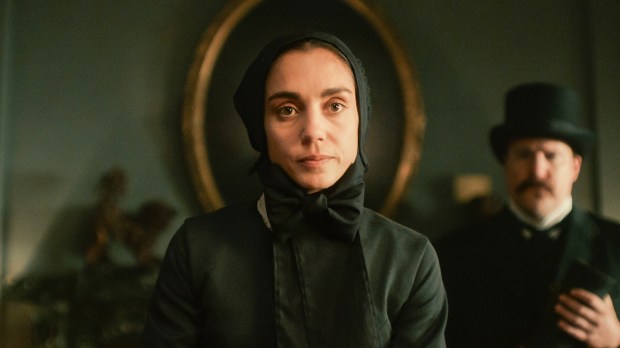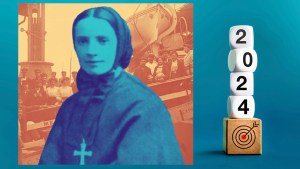Help Aleteia continue its mission by making a tax-deductible donation. In this way, Aleteia's future will be yours as well.
*Your donation is tax deductible!
How does an actress go from years of playing the “main Mafia doll” in a hit Italian TV series to delivering a convincing performance as a good and holy nun?
Cristiana Dell’Anna, who portrays the main character of the new film Cabrini, had some help in that transformation: reading bios and letters of Mother Cabrini, walking the streets where the patroness of immigrants ministered, and carrying around a Mass kit with her for inspiration.
But there was another thing Dell’Anna already carried with her, which helped her get a glimpse into the mind of Mother Cabrini.
Dell’Anna was born in Naples, a city that produced boatloads and boatloads of emigrants in the late 19th to early 20th centuries. Cabrini was from the north of Italy, not Naples, but she was thoroughly immersed in the lives of Italians who sought better lives – and struggled mightily to attain it – on foreign shores.
“We as Neapolitans are all immigrants,” Dell’Anna told Aleteia. “We do say that, you know, ‘Napolitani son emigranti, un popolo emigranti.’”
In fact, actor Liam Campora who portrays Enzo, a teenage New York immigrant and troublemaker, sings at one point in the film a familiar Neapolitan song. “I’ve known that song for my entire life,” Dell’Anna said. “We grow up knowing that we are emigrants, that we’ve always been.”
Members of her own family certainly emigrated – not to New York, where Mother Cabrini worked at first, but to Brazil.
“So I know,” she said. “I know what it feels like. I know what it means to be an immigrant.”
Excerpts from Aleteia’s interview with Cristiana Dell’Anna:
The Imitation of Christ — and Cabrini
Eustace Wolfington, executive producer of “Cabrini,” which is being released March 8, said that Dell’Anna had never been to the United States before the project began filming.
“She was very well known in Italy for her portrayal of the head Mafia doll (the character Patrizia Santore) in a TV series called ‘Gomorrah,’” he said in a press conference.
He added that Dell’Anna came to the US some 30 days before filming began and “isolated herself so she could really get into [the character of] Mother Cabrini.”
Part of that preparation, he said, included reading The Imitation of Christ.
In the same presser, producer Leo Severino said that Dell’Anna carried a Mass kit with her for inspiration. That’s something Mother Cabrini herself did, he said. Because of her love for the Eucharist, she would always ask a priest she happened to run into to offer the Mass for her and her sisters, even if the priest, perhaps on the go, wasn’t fully prepared with liturgical vessels.
But Mother Cabrini was not on Dell’Anna’s radar until she was offered the role. Born in 1985, she chose not to follow her father’s practice of medicine as a career but moved to London at age 20 to study drama at the highly acclaimed Drama Studio London. She made her debut in an English adaptation of the famous Italian play “A Woman Alone” – a production that earned her the attention of London’s Time Out Magazine. Soon after, Dell’Anna was given the lead role in “Moths” – the award winning first short film by acclaimed director Rose Glass (“Saint Maud”).
Before moving back to Italy to start shooting the HBO Max hit crime series, “Gomorrah,” Dell’Anna also appeared in “Third Contact” a critically acclaimed psychological thriller that had its world premiere at the BFI IMAX in 2013.
Found Cabrini in Gomorrah
Her role in Gomorrah has brought her international attention. But it also was because of Gomorrah, based on the book of the same name by Roberto Saviano, that she learned more about a 19th-century nun she had briefly heard about in the past.
“I knew something about Cabrini because in [Saviano’s] latest book, there’s one chapter that is about her,” she told Aleteia.
She said she’s been impressed with many aspects of the saint’s life, including the “sense of responsibility she had towards other people” – immigrants that could very well have been Dell’Anna’s own forbears.
“The fact that she built so many hospitals and schools and she actually provided a worldwide service for the needy, for the poor, for the downtrodden and forgotten people in the world, that’s really inspirational,” Dell’Anna said. “I could experience what it feels like to try to build all that on your own. It was very inspirational to see that a woman, so small, so frail, so fragile, of ill constitution — she suffered from tuberculosis and still achieved so much.
Said Dell’Anna, “I keep saying that she sets an example for everyone to follow, and I might be the first in line to learn from her, especially since I had the luck to portray her.”



